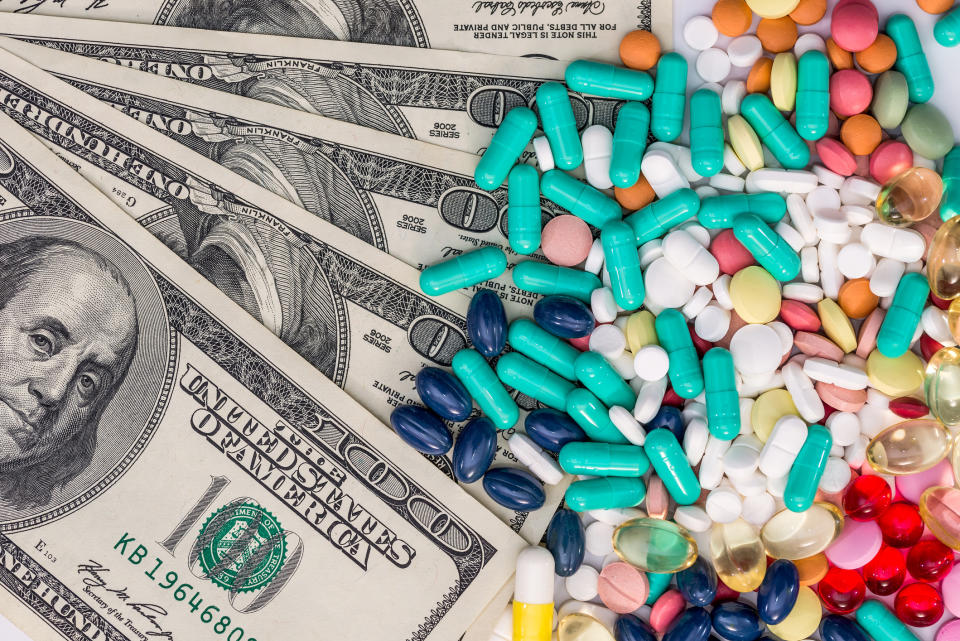2 Biotech Stocks With Major Incoming Catalysts
The end of the first quarter is just a few weeks away and more than a few biotechs still haven't delivered the important clinical trial results they told investors to expect before the end of the period. The clock's ticking for Axsome Therapeutics (NASDAQ: AXSM), Galapagos (NASDAQ: GLPG) and their experimental treatments.
Here's why investors are so eager to get their hands on their trial readouts.

Image source: Getty Images.
Axsome Therapeutics: Hooray for cough syrup?
Physicians have been treating depression with bupropion, the active component in Wellbutrin, since the 1980s, and it could get an unexpected costar in 2019. Physicians and pharmacists generally issue stern warnings not to mix the common cough suppressant dextromethorphan with bupropion, but Axsome is testing a fixed combination of the pair called AXS-05.
You're not supposed to mix the drugs that are in AXS-05 because they amplify each other's effects. Axsome is testing its fixed-dose combination as a treatment for major depressive disorder (MDD) that resists other drugs. AXS-05 is in a pivotal trial right now, and it looks like the combination has longer legs than anyone expected.
Axsome blew everyone away in January with mid-stage trial data that suggest AXS-05 really does the trick. After six weeks, 47% of patients treated with AXS-05 achieved clinical remission compared to just 16% of the placebo group.
Cough medicine isn't the only surprising antidepressant booster. The FDA recently approved Spravato, Johnson & Johnson's (NYSE: JNJ) brand of ketamine nasal spray, to be used along with standard oral antidepressants such as Cymbalta or Zoloft.
Patients who want to use Spravato need to see a healthcare professional, who will squirt the popular party drug from the 1990s up the patient's nose and observe them for at least two hours before letting them drive. Despite ketamine's drawbacks, J&J thinks it can eventually deliver $1 billion in annual sales at its peak.
Around 6.7% of all U.S. adults suffer a major depressive episode each year, and around a third of patients don't respond to standard treatments. If pivotal study results for the easy-to-swallow combination of AXS-05 continue to impress, those blockbuster sales J&J's expecting for Spravato will head toward Axsome.

Image source: Getty Images.
Galapagos: Fingers crossed
Galapagos and its collaboration partner, Gilead Sciences (NASDAQ: GILD), are supposed to release results from two pivotal trials with rheumatoid arthritis patients taking their experimental Janus kinase (JAK) inhibitor, filgotinib, before the end of March. Investors are hoping that none of the patients had problems with blood clots that can start in the extremities then break free and lodge themselves in blood vessels that supply the heart and lungs.
Humira is one of several older rheumatoid arthritis treatments, and it raked in $19.9 billion for AbbVie (NYSE: ABBV) in 2018. Humira's an injection that a lot of patients can't tolerate, and a more effective, easy-to-swallow option could be incredibly successful as well.
Not so long ago, JAK inhibitors seemed like the future for patients with rheumatoid arthritis and related chronic autoimmune disorders. Unfortunately, a small number of potentially lethal blood clots, or venous thromboembolisms (VTEs), observed during clinical trials with Olumiant, a JAK inhibitor from Eli Lilly, put the FDA on guard. The agency limited its approval of Olumiant to a small dosage that isn't expected to generate significant sales.
AbbVie's JAK inhibitor, upadacitinib, is receiving a priority review that the FDA should wrap up in the third quarter. During trials supporting upadacitinib's application, there were a small number of fatal events, but it doesn't look like exposure to upadacitinib raises the risk of VTEs based on exposure times.
There are an estimated 23.7 million people worldwide with rheumatoid arthritis, and most of them are otherwise healthy. That means one potentially lethal event among a few thousand treated during trials can incite the FDA to shut down a program. During the 648-patient Finch 2 study, Gilead and Galapagos didn't report any VTEs, and maintaining a clean safety profile is crucial to filgotinib's future. Finch 1 and Finch 3 contained thousands more patients than Finch 2, and the results are due before the end of March.
If Finch 1 and Finch 3 contain some unwelcome surprises, Gilead Sciences stock could dip, but the highly profitable biotech won't have any trouble making dividend payments. Galapagos is about a million times riskier, but it might be worth it.

Image source: Getty Images.
Worth the risk?
If filgotinib flops, Galapagos' $5.4 billion market cap could get cut in half overnight, but this biotech isn't a one-trick pony. The company's pipeline boasts a handful of clinical-stage programs licensed to big pharma partners, plus some wholly owned assets in clinical-stage testing. The company recorded $359 million in milestone payments last year, which narrowed its annual loss to just $33 million.
Investors can rest a bit easier knowing that there was $1.5 billion in cash on the company's balance sheet at the end of 2018. I was hesitant to call Galapagos a buy last September, but it's probably worth the risk at recent prices.
Axsome could be on to something with its combination of cough medicine and Wellbutrin, and the company recently started another pivotal study with another combination for the treatment of migraine headaches. These aren't exciting innovations, but proprietary formulations of old drugs can generate significant sales, and often succeed.
Axsome's recent $290 million market cap could swell to several times its size if the company gets a chance to market AXS-05. Since both components are well known, approval seems likely enough to make this stock look like a buy.
More From The Motley Fool
Cory Renauer owns shares of Gilead Sciences and Johnson & Johnson. The Motley Fool owns shares of and recommends Gilead Sciences. The Motley Fool has a disclosure policy.
